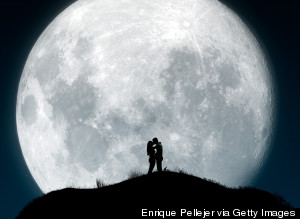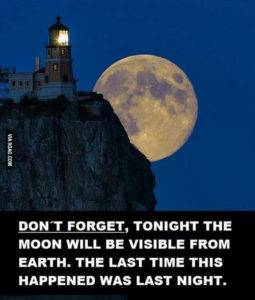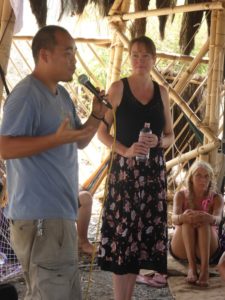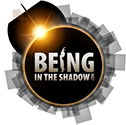
Recently, there was much to-do about the supermoon. In a way, it was great, as people started talking about the moon, and many made a point of going outside to view our closest celestial body. Images like the one above – taken with a telephoto lens capturing the moon illusion – are gorgeous and captivating, and were making the rounds on social media in the fortnight leading up to the supermoon. However, some people saw these posts, read the hype and then expected to see the moon this huge in the night sky. They were then disappointed when it looked just the same as every other full moon they had seen, perhaps a little brighter.

We seem to now be in a situation where the normal – a beautiful full Moon – is no longer enough. It now has to be some super, special, branded thing that people think they are missing out if they don’t see it. Some rare factoid is then used to give it even more meaning, and photos are used out of context – or faked – to create an unnecessary dramatic effect. This over hyping of astronomical events certainly grabs people’s attention, but there is a downside – expectations are raised, and then dashed, and people are left disappointed and disinterested in other astronomical activities. The reality is, there is so much to explore out there in the night sky, every night. We just have to stop and look up.
WHEN HYPE IS APPROPRIATE – BUT HOW MUCH?
But there is one astronomical event that astronomers and science outreach folk actually DO get very, very excited about, and is truly worthy of hype. The total solar eclipse. It is not the rarity that makes this event special – it really, truly is quite an unnatural and awe-inspiring event. Most of the people on social media currently talking about the total eclipse are those who have actually seen one, or are preparing for one. But it won’t be long before social media hype will take over, with unnecessary fake photos and incorrect facts, conspiracy theories and talk of the end of the world. We should brace ourselves.
If you are under 40, live in the US and have never traveled abroad to see a total eclipse, then you will never have experienced one. Yet it is surprising how many people think they have seen a total eclipse, because of misunderstanding media reports and social media posts.
That is why eclipse outreach is so important for those who are living in or near to the path of totality for August 2017. Most people get their astronomical news from social media, where fake stories and images abound. Even in traditional media reports, there are often factual errors and incorrect images. People need accurate information to understand what is to come, why it is a big deal, where they need to go to experience it, what to expect, and how to view it safely.

But if, like me, you share the full details about the total eclipse experience are you also feeding into the hype? Are we raising people’s expectations about this once-in-a-lifetime event, only for them to be disappointed?
Telling people what to expect CAN influence their expectations. But I also believe that you cannot ever spoil or over-hype a total solar eclipse. Totality is very visceral, fully immersive, and goes beyond language. There is no way, using words alone, that you can fully prepare someone for what they may feel and how it will impact upon them.
I have interviewed many scientists who say they thought they would not have any emotional reaction to their first total eclipse as it is a ‘science event’. Yet, despite their ‘superior’ knowledge, they were still as affected as others who knew very little – screaming out ‘oh my God‘, repeatedly, being stunned into silence, and perhaps even crying, as they see the impossible happen. Not everyone has emotional or transformative responses, but it is a rare person who is not moved and completely awestruck by the experience.
I have now spoken with hundreds of people before their first total eclipse, and then afterwards. I get comments such as “I was expecting it to be good, but I didn’t expect it to be THAT good!”, or “If I hadn’t heard you talking about what it would be like, I would never have gone”. I have never had one person say that previous conversations with me has spoiled the experience for them.
When doing my eclipse research, the most common analogy most people relate the total eclipse experience to is the birth of their children. It is a meaningful, significant and life-changing experience. You may know what is to happen, have read about it, talked about it, seen videos, and even read personal accounts. But nothing can prepare you for what goes on physically and emotionally, and how you make sense of it.
THE DISAPPOINTMENT OF TOTALITY – WHEN ALL IS NOT AS IT SEEMS
There have been a few occasions that people have expressed their disappointment, or disinterest – always because they thought they had experienced totality when they hadn’t.
For example, when a total eclipse is clouded out, this can be disappointing as the main features are not seen and experienced. During a post-eclipse lecture back in 2012, one man expressed his disappointment at the over hype of the total eclipse experience, which for him was blocked by thick cloud. He could not accept that there was so much more to what he experienced, and he had no interest in seeing another. It made me understand the importance of ‘expectation management’ – something that I encourage organisers to consider if they are in regions along the path that are likely to be cloudy.
Again in 2012, I was interviewing a local about her eclipse experience, and she didn’t seem to have much of the usual emotion when recounting her day. When questioned further, it transpired that she kept her solar filters on for the whole of totality due to fear of harming her eyes. As a result, she saw nothing, and missed it all.
By far the most common reports of disappointment are made by those who THINK they have seen the total solar eclipse, but were clearly not within the path. One of my colleagues over a period of time kept questioning me on the authenticity of my experience, as he hadn’t felt any emotion at all during totality. After we consulted maps, it turns out that he was located about 400 miles away from the path of totality! He had seen media reporting about the total eclipse, and had assumed that the partial in his area was the main show. He had been adamant that he had seen a total eclipse. I think to this day he STILL thinks they are no big deal – his loss.
MY APPROACH TO ECLIPSE OUTREACH
Everyone has different drives and motivations. Some people are much more open to having new experiences – these are the people who will seek out information themselves about the eclipse. But for most others within the path of totality, they will need information that helps them to understand the unique experience that is to come, so they can plan to see it.

When I do my talks, I talk from my personal experience, but also from my research as well. Sharing the experiences of many gives me the ability to highlight how unique and meaningful the total eclipse experience is. There are similarities, of course, but the impact is deeply personal. I can describe differences in how people make sense of that feeling of connection – it could be a connection to nature, the universe, mother earth, or some religious figure. I never know what that will mean for each person – but I can give examples of how others have made sense of it. This information may help people to put language to the profound experience they have, but it doesn’t necessarily change the lived experience. Nor does it spoil it for them.
So, should you read and listen to other people’s accounts of totality before you see it for yourself? I think yes. Reading the accounts of others, listening to eclipse chasers – these things may influence how you think about it, and how you act. That is, it might make you more likely to get into the path of totality, and to convince others to go along with you. Without knowing that it really is quite a special event, you just may miss this chance, and regret it for a lifetime.
My next book features personal total eclipse experiences from a small number of ordinary people, and will be self published and available from my website in early 2017. I also plan to engage in a speaking tour of the path of totality in 2017. Formal announcements will occur soon. Get in touch if you would like your community to be included in my tour.
